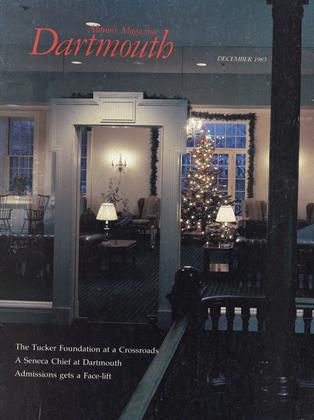The Thayer School of Engineering has been given the green light by the Trustees to undertake a major expansion over the next six years. This action is in response to the increasing technological needs of society, including the growing demand for engineers, particularly in the areas of electronics and computers.
The plans were announced by President McLaughlin to the faculty following the Trustees' fall meeting. He reported that the Trustees had approved a gradual increase of 50 percent in tenure-track faculty and a 60 percent increase in graduate student enrollments. The expansion will accommodate a modest increase in undergraduate majors as well.
To provide the added physical space and financial support necessary for the expansion, the board also authorized Thayer to launch a special two-part effort to raise a total of $17.5 million.
Of that sum, $10 million will be earmarked for endowment and $7.5 million for the construction of a 41,000 square-foot addition to the school. According to present projections, the addition will enlarge Thayer School's total building space by 41 percent. Special attention will be given to laboratory facilities, which will be enlarged by 72 percent. President McLaughlin stressed that, under the Trustees' authorization, actual construction may begin only when funds for that purpose have been raised. Thayer School Dean Carl F. Long, who has presided over a steady growth that has had the school bulging at the seams in recent years, said he expects construction may be able to start in 1985.
Commenting on the Trustees' action, physicist Agnar Pytte, College provost and senior academic administrator, declared that the expansion "opens up exciting, new possibilities for engineering at Dartmouth. It will allow Thayer School to respond vigorously to the revolution in engineering and engineering education brought about by the many striking technological developments of recent years."
In this context, the expansion will keep at the forefront of engineering education the 112-year-old graduate school founded as one of the nation's first centers of civil engineering training.
"In particular," Pytte stated in a report to the Trustees, "Thayer School will be greatly strengthened in its efforts in computer assisted design, in robotics, and in computer engineering generally."
He noted that the number of undergraduates majoring in engineering has nearly doubled in recent years to almost 100, making the engineering department the fifth largest in terms of majors at the College. If engineering majors are added to the number of undergraduates currently majoring in computer science, they together account for "roughly half" of all majors in the science division, Pytte noted.
With the strength Dartmouth already possesses in its Kiewit Computation Center, "Dartmouth can aspire to become absolutely first-rate in computer related studies," the provost noted.
Pytte also stressed Thayer School's versatility resulting from its collaborative programs with Dartmouth Medical School in biomedical research and biotechnology, with the Army Cold Regions Research and Engineering Laboratory (CRREL) here in material research, and its recognized program in fluid mechanics. All of these programs, he said, will be strengthened as the faculty expansion enables them to "achieve the 'critical mass' required for excellence."
In actual numbers, the planned expansion of Thayer School will mean that by the end of this decade the tenure-track faculty will have increased from 20 to 30.5 full-time equivalents. The number of candidates for graduate degrees masters, doctorates, and the bachelor of engineering, which at Dartmouth is a graduate program will rise from 125 to 200. Among the advanced degree programs, candidates will increase from about 35 to 50 for the bachelor of engineering degree, from 80 to 100 for the two-track masters degrees of engineering and science, and from 10 to 40 for the similar two-track doctoral degrees of engineering and philosophy. Majors in the undergraduate department of engineering are expected to go up from about 100 in each of the upper classes to 120, to increase the total number of majors to 360.
 View Full Issue
View Full Issue
More From This Issue
-
 Feature
FeaturePsycho-Social Dynamics and the Prospects for Mankind
December 1983 By Charles E. Osgood '39 -
 Feature
FeatureMaris Bryant Pierce: A Seneca Chief at Dartmouth
December 1983 By Howard A. Vernon -
 Cover Story
Cover StoryCROSSROADS
December 1983 By Shelby Grantham -
 Feature
FeatureOn a Scale of 1 to 10...
December 1983 By Brad Hills '65 -
 Feature
FeatureAdmissions gets a Face-lift
December 1983 By Nancy Wasserman -
 Sports
SportsSports
December 1983 By Kathy Slattery
Article
-
 Article
ArticleAt a dinner meeting of the Dartmouth
March 1961 -
 Article
ArticleThe College
November 1979 -
 Article
ArticleDartmouth Authors
JANUARY/FEBRUARY 1984 -
 Article
ArticleEngine, engine number 9
June 1987 -
 Article
ArticleWerner Janssen's New Quintet
JUNE 1966 By JOHN H. CHIPMAN '19 -
 Article
ArticleThe Undergraduate Chair
November 1938 By Ralph N. Hill '39


